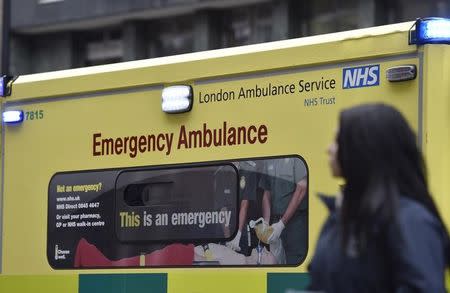Love-in for health service looms large in British election

By Ben Hirschler LONDON (Reuters) - "Oh, you girls are lovely. I wouldn't do your job for all the money in the world," says the elderly orthopaedic patient as two nurses help her off a bedpan. Across the ward, another woman on the mend after a fall says her stay has cured a life-long fear of hospitals. Given regular headlines about overflowing emergency rooms, horrendous waiting times and cancer drug rationing, Britain's love affair with the National Health Service (NHS) can be perplexing to outsiders. Yet the system, launched in 1948, is cherished by the nearly 1 million people who use it daily and receive free care at the point of use from childbirth to hip replacements. Protecting the health service is centre-stage in the run-up to this week's election, with rival parties locked in a war of funding promises - and warm words - for an overburdened and occasionally chaotic organisation. "It is my life's work," Prime Minister David Cameron insisted in front of a television audience last week, as he battled voter distrust of his Conservative Party's handling of healthcare. With a workforce of more than 1.6 million, the NHS ranks among the world's top five employers alongside the U.S. Department of Defence, McDonald's , Wal-Mart and the Chinese People’s Liberation Army. Such behemoths rarely win popularity contests, yet Cameron said his family had received "fantastic care, support and I'd say love from people in the NHS" for his disabled son Ivan, who died in 2009. He is not alone. The appreciation of elderly orthopaedic patients in a suburban London hospital is duplicated across the country. Many of these elderly fall victims will benefit from modern artificial hips that were first pioneered by the NHS in the 1960s. In the run-up to the May 7 election, 47 percent of Britons list the NHS as their top concern when deciding how they will vote, a full 12 points ahead of management of the economy, according to polling group Ipsos MORI. That's a reversal from the 2010 election, when the economy came top and health second, and Cameron knows he is on the back foot on the topic, with health a stronghold for the opposition Labour Party that created the NHS. BEING BRITISH "It's a key issue," says Gideon Skinner, Ipsos MORI's head of political research. "The NHS plays a crucial role in the public's view of what it means to be British and pride in the NHS is very high." Former finance minister Nigel Lawson famously called the NHS “the nearest thing the English have to a religion”. In an effort to sideline critics, who fear the Conservatives will under-fund the system and contract out services to private companies, Cameron has pledged to plug fully the estimated 8 billion pounds ($12 billion) a year funding gap facing the NHS by 2020, without saying how this will be paid for. NHS England, by far the largest part of the service, needs an extra 30 billion pounds annually by 2020 and hopes to meet 22 billion of that through improved efficiency. Labour has pledged to spend 2.5 billion pounds more than current government plans. The NHS is certainly not perfect but by international standards it is cost-effective. Britain spent 9 percent of GDP on health in 2013, against 12 percent for France and 17 percent for the United States, according to the World Health Organization. Yet the country's health system was rated top out of 11 advanced economies last year by the U.S.-based Commonwealth Fund. Despite all the fine words, however, it is still far from clear if any potential new government will do enough to maintain standards of care in the face of an ageing population and spiralling treatment costs. Achieving 22 billion pounds of savings will require unprecedented productivity gains, and three-quarters of NHS finance directors surveyed recently by the King's Fund think-tank said there was a high or very high risk the target would be missed. In the heated political debate over NHS funding, King's Fund chief executive Chris Ham prescribes "a dose of realism". ($1 = 0.6605 pounds) (Editing by Raissa Kasolowsky)

 Yahoo News
Yahoo News 